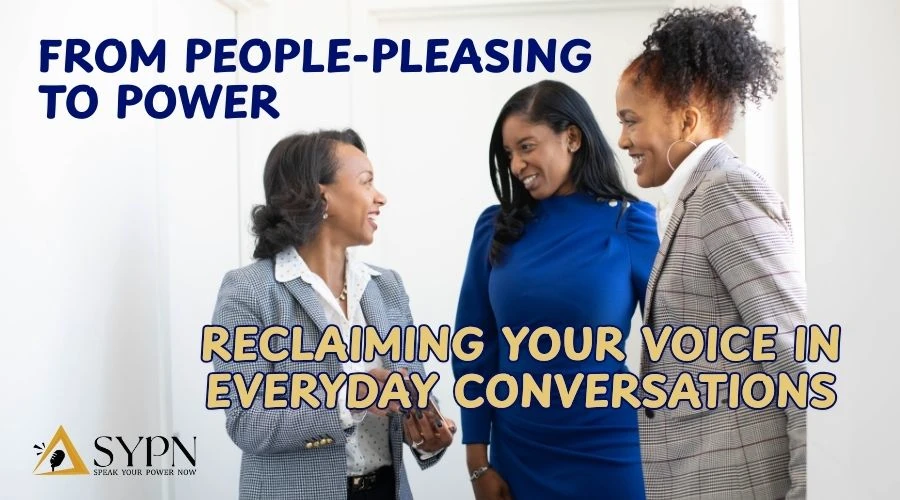Introduction
If you find yourself saying “yes” when everything inside you is screaming “no,” you’re not alone. People-pleasing is a deeply ingrained survival mechanism—often learned early in life as a way to avoid conflict, gain approval, or simply stay safe. But here’s the hard truth: people-pleasing is not the path to personal freedom, fulfillment, or authentic connection.
True power lives in your voice—in your ability to express your needs, set your boundaries, and stand rooted in your truth. And the good news? You can unlearn the habit of people-pleasing and step into your power, one honest conversation at a time.
Why We People-Please
At its core, people-pleasing is an attempt to secure love, approval, or safety. Many of us were taught—directly or indirectly—that:
- Good girls (or boys) don’t cause problems.
- Love must be earned by being easy to deal with.
- Disagreeing or saying “no” makes you difficult, selfish, or ungrateful.
When these messages take root, we internalize the idea that our value is tied to how much we accommodate others. As a result, you might:
- Say “yes” to things that drain your energy.
- Avoid voicing your true feelings to keep the peace.
- Feel responsible for other people’s emotions.
- Believe that setting boundaries will lead to rejection or conflict.
But here’s what’s really happening:
Every time you silence your truth to make others comfortable, you abandon yourself.
The Cost of People-Pleasing
People-pleasing isn’t a harmless quirk—it carries real emotional and psychological consequences. Over time, the habit of prioritizing others’ comfort over your own needs leads to:
Loss of Authenticity
When you continually mold yourself to meet other people’s expectations, you lose touch with who you really are. Your preferences, desires, and even your identity can start to feel blurry.
Chronic Burnout
Saying yes to everything (and everyone) leaves little time, energy, or space for your own well-being. Chronic people-pleasers often experience exhaustion, resentment, and even physical symptoms like headaches, insomnia, or anxiety.
Emotional Disconnection from Self
Ignoring your true feelings causes emotional numbing over time. You may struggle to identify your needs, feel guilty for having needs at all, or experience a persistent sense of emptiness.
How to Reclaim Your Voice
The shift from people-pleasing to powerful communication doesn’t happen overnight. It’s a daily practice—a series of small, courageous choices that build self-trust and self-respect. Here’s where to start:
1. Notice When You Self-Abandon
Self-abandonment happens when you prioritize others’ wants at the expense of your own truth. Learning to recognize this pattern is the first step toward change.
Signs you may be self-abandoning:
- You immediately agree to requests without checking in with yourself.
- You feel a pit in your stomach after saying yes.
- You constantly worry about how others perceive you.
- You feel disconnected, resentful, or invisible after conversations.
Practice:
Pause before responding. Even just 10 seconds of silence can help you notice your inner “yes” or “no.”
2. Ask Yourself: “What Do I Actually Want?”
People-pleasers often lose touch with their own desires because they’re so focused on others. Reconnecting with your own wants and needs is essential.
Daily check-in questions:
- What do I want right now?
- What would feel good, nourishing, or supportive to me?
- Am I saying yes out of guilt, fear, or obligation?
Give yourself permission to want what you want. Your needs are valid—even if they inconvenience someone else.
3. Use Boundary-Setting Phrases
You don’t have to over-explain, apologize, or justify your boundaries. Simple, direct communication is powerful and respectful.
Examples of boundary-setting phrases:
- “That doesn’t work for me.”
- “I’m not available for that.”
- “I need some time to think about it.”
- “I appreciate the invite, but I’ll have to pass.”
- “I’m focusing on my priorities right now.”
Remember:
A boundary is not a rejection of the other person—it’s an affirmation of your relationship with yourself.
4. Normalize Discomfort
Setting boundaries will feel uncomfortable at first. You might feel guilty, selfish, or fear that others will be upset.
That’s normal.
Discomfort is not a sign you’re doing something wrong—it’s a sign you’re doing something new. You’re building a new pattern. Stay the course.
5. Reframe “No” as an Act of Honesty
Saying “no” doesn’t make you rude, mean, or ungrateful. It makes you honest. And honesty is the foundation of trust—not just with others, but with yourself.
When you say “yes” but mean “no,” you create silent resentments that erode relationships over time.
When you say “no” with kindness and clarity, you honor both yourself and the relationship.
Empowering Reminder
You are not responsible for managing other people’s emotions.
You are responsible for honoring your own truth.
Every time you speak up, set a boundary, or choose yourself, you’re rewriting old survival scripts.
You’re teaching your nervous system that it’s safe to be honest.
You’re moving from people-pleasing to personal power.
And every small act of reclaiming your voice matters.
Final Thoughts
Healing from people-pleasing isn’t about becoming harsh, detached, or indifferent. It’s about becoming more authentic, self-aware, and aligned.
It’s about trusting that your worth is not dependent on how useful, agreeable, or available you are to others.
Your voice is a sacred tool for creating a life that feels true to you.
Use it.
Honor it.
Let it lead you home to yourself.
Ready to start reclaiming your voice in everyday conversations?
Download our Boundaries & Voice Mini Guide—a practical, printable resource with scripts, journaling prompts, and affirmations to help you set boundaries with confidence.
Because your “no” is powerful—and your “yes” is sacred.



